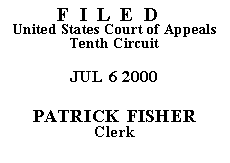

| CLARENCE DAVIS,
and DREW EDMONDSON, Attorney General of the State of Oklahoma, Respondent. |
No. 00-6080
(D.C. No. 99-CV-1680-R) |
Because Davis challenges not the validity of his conviction and sentence but rather the implementation of the Oklahoma Truth in Sentencing Act, 1997 Okla. Sess. Laws ch. 133 ("the Act"), we analyze his claim as if it had been filed under 28 U.S.C. § 2241 rather than 28 U.S.C. § 2254. See Montez v. McKinna, 208 F.3d 862, 863 (10th Cir. 2000). A state prisoner bringing § 2241 claims must be granted a certificate of appealability ("COA") prior to being heard on the merits of the appeal. See id. at 869.
On April 29, 1989, Davis pleaded guilty to obtaining money by false pretenses after former conviction of two felonies and was sentenced to thirty years' imprisonment. Davis filed an application for post-conviction relief in state court challenging the implementation of the Act, which was denied. His appeal of this denial of post-conviction relief was likewise denied.
In his habeas petition, Davis presents three claims: (1) application of the Act to him eliminated a pre-parole conditional supervision early release program in violation of the Ex Post Facto Clause; (2) the Oklahoma Court of Criminal Appeals ("OCCA") erred in considering an affidavit submitted by the Oklahoma Attorney General in his state post-conviction proceeding; and (3) the OCCA misinterpreted the provisions of the pre-parole program eliminated by the Act. The magistrate judge recommended denial of habeas relief, and the district court adopted the findings of the magistrate and denied relief. Because the district court did not act on the issue of COA, it is deemed denied.
In his application for COA, construed liberally, Davis raises the same three claims presented below. He also raises for the first time on appeal arguments pertaining to lack of opportunity to object to the magistrate's report and recommendation. These arguments are plainly without merit. The record readily reveals Davis's extensive and timely objections to the magistrate's recommendation, that the district court reviewed de novo.
With respect to Davis's claims that the OCCA erred in considering the Oklahoma Attorney General's affidavit in post-conviction proceedings and that it erred in interpreting the Act, we find no "substantial showing of the denial of a constitutional right." 28 U.S.C. § 2253(c)(2). Federal habeas review does not extend to the correction of purely state law procedural errors that do not rise to the level of a constitutional due process violation; the alleged procedural irregularity in considering the affidavit does not represent a violation of the constitutional due process standards for a post-conviction proceeding. Moreover, insofar as Davis's third claim challenges the state court's interpretation of state law, it fails to state a claim that Davis "is in custody in violation of the Constitution or laws or treaties of the United States." 28 U.S.C. § 2241(c)(3).
Davis has, however, "made a substantial showing of the denial of a constitutional right to the extent he is asserting the Act's elimination of pre-parole and early release programs violates the Ex Post Facto Clause." Blue v. Klinger, No. 98-6159, 1998 WL 738341, at **2 (10th Cir. Oct. 22, 1998) (unpublished); see also McMeekan v. Klinger, No. 98-6247, 1998 WL 852551, at **1 (10th Cir. Dec. 10, 1998) (unpublished). If he "can demonstrate he was entitled to pre-parole or early release under the pre-Act statutes, the Act's elimination of those programs would in fact constitute a violation of the Ex Post Facto Clause." Blue, 1998 WL 738341, at **2 (citing Lynce v. Mathis, 519 U.S. 433 (1997)). However, we have held that a showing that "it was speculative at best that [a petitioner's] ultimate release date was affected by elimination of [pre-parole conditional supervision] programs" does not present a viable Ex Post Facto claim. Sparkman v. Klinger, No. 99-6244, 1999 WL 1083752, at **2 (10th Cir. Dec. 2, 1999) (unpublished).
The OCCA found that because Davis was required to serve the balance of a 1979 sentence due to the revocation of his parole in that case, he was never within twenty-one months of his projected release date, as required for eligibility for pre-parole conditional supervision programs pursuant to 57 Okla. Stat. Supp. 1993, § 365(A)(2), and that he could not meet the necessary conditions for release on parole after completion of two concurrent 1989 sentences. The OCCA concluded that Davis "has never established eligibility for the PPCS program. Therefore, he cannot show he was disadvantaged by the repeal of the program or that such repeal is an ex post facto law as applied to him." Davis v. Oklahoma, No. PC 99-18, at 2 (Okla. Crim. App. July 21, 1999). The district court agreed, holding that Davis "has not established he was entitled to pre-parole before the enactment of Truth in Sentencing." (R. Doc. 13 at 1-2.) The district court did not err in finding Davis presented no viable claim.
Davis's request for a certificate of appealability is DENIED, and this appeal is DISMISSED as to claims one and three. His request for a certificate of appealability is GRANTED with regard to claim two, as to which the judgment of the district court is AFFIRMED.
The mandate shall issue forthwith.
ENTERED FOR THE COURT
Carlos F. Lucero
Circuit Judge
*. The case is unanimously ordered submitted without oral argument pursuant to Fed. R. App. P. 34(a)(2) and 10th Cir. R. 34.1(G). This order and judgment is not binding precedent, except under the doctrines of law of the case, res judicata, and collateral estoppel. The court generally disfavors the citation of orders and judgments; nevertheless, an order and judgment may be cited under the terms and conditions of 10th Cir. R. 36.3.